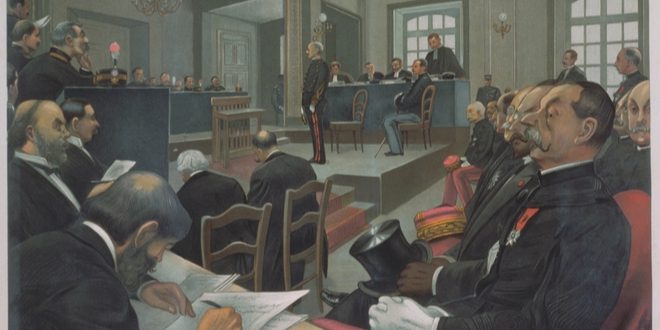France posthumously promoted Alfred Dreyfus to brigadier general on Tuesday, 130 years after the Jewish army captain was falsely convicted of treason in what became one of history’s most infamous cases of state-sponsored antisemitism. French President Emmanuel Macron and Prime Minister Sébastien Lecornu signed the promotion into law on Monday, with the decision published in the Journal Officiel de La République Française the following day. The French Parliament’s lower house unanimously approved the legislation in June, and the Senate backed it earlier this month.
The promotion comes as France grapples with a surge in antisemitic attacks against its Jewish community—the largest in Europe and the third-largest in the world after Israel and the United States—following the October 7, 2023, massacre by Hamas terrorists in southern Israel. French officials frame the Dreyfus promotion as a “symbolic step” in combating modern antisemitism. Still, the gesture raises a critical question: Can symbolic acts of historical justice address the violent hatred targeting Jews in France today?
The Bible teaches that justice delayed is justice corrupted. “Justice, justice shall you pursue, that you may live and possess the land which the Lord your God gives you” (Devarim/Deuteronomy 16:20). The Hebrew doubling of the word tzedek (justice) is understood by the Sages to mean that justice must be pursued through just means and without delay. The 130-year gap between Dreyfus’s exoneration in 1906 and this promotion underscores a troubling pattern: France acts on antisemitism only when it becomes politically convenient or historically safe.
Dreyfus, a 36-year-old captain from Alsace, was accused in October 1894 of passing military secrets to Germany. The accusation rested on flimsy handwriting analysis of a document found in a German attaché’s wastebasket. Despite the lack of evidence, Dreyfus was convicted amid a vicious antisemitic press campaign, sentenced to life imprisonment on Devil’s Island in French Guiana, and publicly stripped of his rank in a degradation ceremony designed to humiliate him before the nation.
The case split French society. Novelist Émile Zola penned his famous “J’accuse…!” pamphlet defending Dreyfus, while Lieutenant Colonel Georges Picquart reinvestigated and discovered the real traitor was Ferdinand Walsin Esterhazy. When Picquart presented his evidence to the French army’s general staff, he was expelled from the military and jailed for a year. Esterhazy was acquitted. The message was clear: protecting the army’s reputation mattered more than justice for a Jew.
Dreyfus was brought back to France for a second trial in June 1899, found guilty again, and sentenced to 10 years before receiving a pardon that did not clear his name. Only in 1906 did France’s High Court of Appeal overturn the verdict, exonerating him and reinstating him as a major. He received the Légion d’Honneur, served in World War I, and died in Paris in 1935 at age 76.
“Though symbolic and significantly late, the posthumous promotion of Alfred Dreyfus is a welcome gesture,” Daniel S. Mariaschin, CEO of B’nai B’rith International, told JNS. “That said, with the dramatic rise in antisemitism in France, which seems to grow by the day, it is vitally important that the same officials who have addressed themselves to the historic wrongs against Alfred Dreyfus should now—with the same energy and conviction—address the mounting antisemitism which has deeply impacted the French Jewish community.”
The Dreyfus Affair did more than expose French antisemitism—it birthed modern Zionism. Theodor Herzl, covering the trial as a journalist, witnessed the Parisian mobs chanting “Death to the Jews!” and concluded that Jewish emancipation in Europe was a failed experiment. If France—the birthplace of Enlightenment ideals and Jewish civil rights—could turn on its Jewish citizens with such ferocity, no diaspora community was safe. Herzl’s response was Der Judenstaat (The Jewish State), published in 1896, which launched the political movement to return the Jewish people to their ancestral homeland.
The Bible’s vision of justice demands more than ceremonies and symbolic promotions. It requires action. France honors Dreyfus with a military rank he can never wear while French Jews face assault, firebombing of synagogues, and daily harassment in the streets. The promotion is not a victory over antisemitism—it is a reminder that France still prefers remembering dead Jews to protecting living ones.
Dreyfus’s story teaches that when Jews rely on the goodwill of nations, they are always vulnerable. The Jewish state exists precisely because of cases like Dreyfus—because history proved that justice for Jews comes only when Jews control their own destiny. France can promote Dreyfus to any rank it chooses, but it cannot erase the lesson his persecution taught: that the only guaranteed refuge for the Jewish people is Israel.




